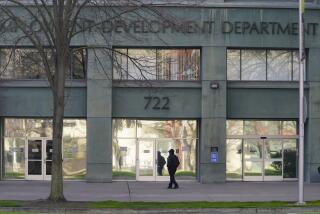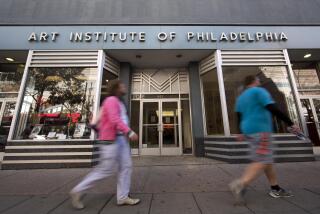California bans ITT tech from accepting new students

- Share via
The for-profit college chain ITT Educational Services has been banned from accepting new students at its 15 California locations under an emergency decision issued Friday by the state Department of Consumer Affairs’ Bureau for Private Postsecondary Education.
The state will also seek to revoke ITT’s approval to operate in California.
The emergency order, which takes effect Sept. 1, comes one day after the U.S. Department of Education banned ITT from enrolling new students who use federal financial aid.
“The federal action raises grave concerns about the continued financial viability of ITT,” bureau chief Joanne Wenzel said in a press release. “We took today’s action in the interest of protecting potential students who are considering enrolling in ITT.”
Federal officials announced the action Thursday amid a series of measures that could threaten the survival of the chain, which has been the subject of state and federal investigations focusing on its recruiting and accounting practices. Company officials did not immediately comment.
Among the measures, ITT has been ordered to pay $152 million to the department within 30 days to cover student refunds and other liabilities in case the company closes. The chain, based in Indiana, is still paying an additional $44 million demanded by the department in June for the same reason.
The Education Department also has prohibited ITT from awarding its executives any pay raises or bonuses, and it must develop “teach-out” plans that would help current students finish their programs at other colleges if the chain shuts down.
Under the new measures, current students can continue receiving federal grants and loans.
Education Secretary John King said the government is taking action to protect students and taxpayers following “troubling” findings about the company. This month, a group that accredits ITT found that the chain failed to meet several basic standards and was unlikely to comply in the future.
“It simply would not be responsible or in the best interest of students to allow ITT to continue enrolling new students who rely on federal financial aid,” King said during a telephone conference with reporters.
If it fails to follow the government’s demands, ITT could be cut off entirely from federal aid, the top source of revenue for most for-profit colleges.
ITT operates vocational schools at more than 130 campuses in 38 states, often under the ITT Technical Institute name. Last year, it enrolled 45,000 students and reported $850 million in revenue.
One of the biggest for-profit chains in the nation, ITT has been under increasing scrutiny from the Education Department following allegations of misconduct.
The Massachusetts attorney general sued the company in April, alleging that it misled students about the quality of its programs. The federal government had previously sued the chain, saying that it pushed students into high-cost private student loans knowing they would likely end in default.
Department officials have been closely monitoring ITT’s operations since 2014, when the chain was late to submit an annual report of its finances to the government.
Under President Obama, the Education Department has led a crackdown on for-profit colleges that have misled students or failed to deliver the results they promised. In 2014, the department cut off federal aid to the Corinthian Colleges chain amid allegations of fraud, leading it to close or sell all of its schools.
MORE BUSINESS NEWS
Fed Chair Janet Yellen: The case for another interest rate hike ‘has strengthened in recent months’
How to calculate the ‘magic number’ for college savings
Apple boosts iPhone security after powerful spyware targets an activist
UPDATES:
4:05 p.m.: This article was updated with new action from California.
This article was originally published at 8 a.m.
More to Read
Inside the business of entertainment
The Wide Shot brings you news, analysis and insights on everything from streaming wars to production — and what it all means for the future.
You may occasionally receive promotional content from the Los Angeles Times.










